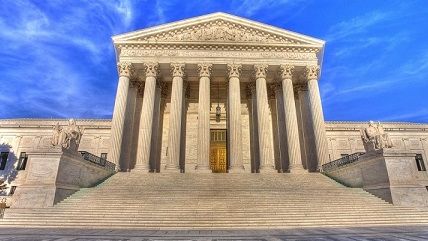Supreme Court Appointments a Big Deal Because Government Constantly Overstepping Bounds
If the other branches of government stayed within their constitutional limits, the Supreme Court wouldn't be as prominent.

"If you don't believe this election is important," said Bernie Sanders at the Democratic National Convention, "if you think you can sit it out, take a moment to think about the Supreme Court justices that Donald Trump would nominate and what that would mean to civil liberties, equal rights and the future of our country."
The wind-up there is pretty silly. If you don't believe the election is important, you probably didn't spend your precious leisure time watching Sanders address the DNC. There are a lot better shows on TV.
Sanders' pitch, however, is—as they say—resonant.
Fear about future Supreme Court nominees resonates among Democrats, who don't want to see Antonin Scalia replaced by another Antonin Scalia.
Worry over Supreme Court picks also resonates among Republicans: Ensuring a conservative majority on the court is a major reason to support Trump, said delegates to the GOP convention last month.
In one regard this is perfectly rational. Anthony Kennedy, the swing vote, is 80. Ruth Bader Ginsberg is 83. Stephen Breyer is 77, Clarence Thomas 68. Scalia's seat seems likely to stay open until at least November and probably until next spring. So President Obama's successor could appoint two, three, or even four justices, especially if he or she wins a second term.
In another regard, however, the heavy emphasis on the Supreme Court is rather dispiriting.
It is dispiriting because the court's principal function consists of setting the boundaries for government action. In that role, it ought to be heard from only on rare occasions—that is, if the other branches of government respect the limits the Constitution imposes upon them.
Unfortunately, the other branches do not, and the Supreme Court has had to step in time and again to yank their leashes—or, just as often, to let them run free.
During the Bush administration, the court had to put its foot down more than once with regard to habeas corpus. In Rasul v. Bush, it declared that the principles of habeas corpus applied even to non-citizens held at Guantanamo Bay. Congress tried an end-run around that ruling with the Military Commissions Act; the court ruled the legislation unconstitutional.
In 2008 and again in 2010, the Supreme Court ruled that the Second Amendment protects an individual right to keep and bear arms. In 2010, it defended the First Amendment when it ruled—in Citizens United—that government cannot censor books and movies just because they support or oppose the election of political candidates.
In 2012, the court upheld the constitutionality of Obamacare's mandate forcing people to buy insurance—but two years later it exempted religious employers from a similar mandate.
In 2015, it declared same-sex marriage a constitutional right and defended the First Amendment again from ordinances regulating signage. This year it brushed back restrictions on abortion and challenges to affirmative action in higher education.
Partisans have rarely greeted such decisions with Buddha-like serenity.
Republican Gov. Scott Walker of Wisconsin proposed a constitutional amendment to let states decide the legality of gay marriage. There is now substantial liberal support for repealing the Second Amendment, and it's pretty clear that Democrats have grown tired of the First Amendment, too: Hillary Clinton has threatened to rewrite it "in my first 30 days as president" to reverse Citizens United.
As the debate over Hobby Lobby demonstrated, many progressives also think religious liberty should be respected only in church—and sometimes perhaps not even then: Iowa's human-rights council recently had to rewrite a brochure on sexual orientation and gender identity that seemed to suggest churches might get in trouble for preaching the wrong things about such issues.
This is troublesome because of the misunderstanding it reveals about fundamental rights and liberties. By definition, individual rights have intrinsic worth and cannot be outweighed by competing considerations such as national security or a "level playing field" among political speakers during campaign season.
Yet too many today act as though rights have only instrumental worth: They are useful so long as they serve some higher purpose, but can be overridden for a sufficiently strong reason—such as a hoped-for marginal reduction in national health-care expenditures or a hoped-for marginal renaissance of the "traditional American family."
***
The result of this sort of thinking is that both Congress and the executive branch, both Republicans and Democrats, are constantly pushing to expand the scope of government power—always for a good cause, of course!—rather than respecting the proper boundaries of government action. And they all want the Supreme Court to thwart the opposition but enable their own designs.
Rather than obey the rules—the Constitution—they want the umpire to rewrite the rules in their favor. And so the Supreme Court, which should be called on to mediate such disputes only rarely, has become as politically important as the other two branches.
America doesn't need more politicians who will bend the Supreme Court to their will. It needs politicians who will keep their own designs within constitutional limits in the first place.
This column originally appeared at the Richmond Times-Dispatch.


Show Comments (30)